Subject to Change Without Notice
The Ten, No Twenty, No Twenty One* Best Books I
Read Last Year
Commentary by Rick Kleffel
The Agony Column for January 07, 2003
(*As of 01-08-03)
Today I'm posting the first annual Agony
Reading List for 2002. I'll do what I can to format and make it
readable. See how miserably slowly I read! Gape in wonder at the
money spent! And when you're done you can come back and read a brief
essay on those I think are the ten best as of January 7, 2003. This
list is subject to change without notice, change on a whim that makes
reasons for going to war look positively rational.
Damn, was that hard. I just came back from the Excel spreadsheet I
use to keep track of what the hell I'm reading and how long it takes,
and the first top ten list had 22 titles. Everything on there was a
must-stay-on event book. Readers should understand that since I pick
the books I read carefully, I pretty much like everything I read and
all of them almost equally. In fact, looking back, I can guarantee
readers that I did not read very many books I didn't like. That is
not to say that I read no books I didn't like, or at least, didn't
love. It is NOT true that I've never met a book I didn't like.
Well, anything might change if it takes me more than today to
write this damn column. But as it stands this instant, here are the
ten best books I read in 2002, in author's-last-name alphabetical
order. I really couldn't rank these, and as I said, if tomorrow I
decided, for example, that slow reading was the best experience in
the universe, the list might be different, or if I decided that
non-fiction reading was the best experience in the universe.

|

|
|
This was the first but certainly not the last Neal
Asher novel I read. 'Gridlinked' has a great over-the-top
feel that makes it really fun to read.
|
This novel has all the wildness of Asher's
'Gridlinked', but more than that a certain wistful feel of
the open ocean. Plus, lots of monsters.
|
For all that his stuff feels fresh and new to me, I've been
reading Neal Asher for almost two years now, since I first bought
'Gridlinked'.
'The Skinner', his
Pan Millennium trade paperback from last year is number one on my
list of Books that Should Have Come Out in Hardcover. 'The Skinner'
is a sequel of sorts to 'The Engineer' and 'Gridlinked', or at least
it takes place in Asher's Polity universe. In 'The Skinner', Asher
manages create a feeling that is both frenzied and serene, wildly
inventive and alluring familiar. That atmosphere and all that
invention has really stuck with me, and I'd love to plunge into this
world again. In fact, I'll get my chance soon enough when I start
what I anticipate to be one of the big SF novels of this year, 'The
Line of Polity'. The appeal of Asher's universe and writing is that
he is able to use deceptively simple and gulpable bits of character
and description to build up what comes to be a surprisingly complex
and engaging story. And despite the savagery, the monsters, the wild
alien killers, at base Asher has a deep affection for his blazingly
wild creations. It shows, and it grows on the reader.
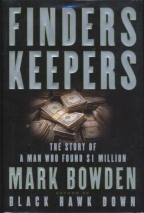
|
|
Page-turning, insightful, funny, sad, the whole range
of human experience in a short and well written non-fiction
work that reads like a novel.
|
From the utterly wild to the wildly mundane, Mark Bowden's
'Finder's
Keepers' is a close, careful, and hilarious portrait of a man who
in 1981 found one million dollars in unmarked $100 bills. The money
had literally fallen off the back of the truck and into the hands of
Joey Coyle, an unemployed dock worker and a meth addict. What happens
over the next seven days is alas utterly believable, but told with
such precise language and perfect attention to the tiniest detail
that this compact work of non-fiction carries the feel and the power
of a larger, almost Dickenesque novel. Bowden's writing is pristine
and clear. His ability to create a story arc out of the raw material
of Phildelphian reality is aided by Coyle's incredible story. And
where the story gets really incredible, Bowden manages to portray
differing versions of the same events with such clarity that the
reader can keep track of the competing stories. Fiction is rarely
this interesting or this well written. 'Finder's Keepers' tells one
hell of an interesting story, portions of which are largely true.
Bowden's skill is such that even when his interviewees are likely to
be lying, he seems to be getting closer to the truth.
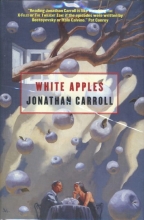
|
|
Jonathan Carroll proves himself to be a master of the
jaw-drop in 'White Apples'.
|
Some writers manage to make you remember that you're not reading
just a story, you're reading language, words written by a
professional artist. Jonathan Carroll is one of those writers who
manages to knock the reader's brain out of the ball park with a
wonderful turn of the phrase, a bit of dialogue so clever that you're
wondering what movie star will be speaking it. In 'White
Apples' brings his usual linguistic talents to bear on a plot
that is every bit as wildly inventive as the words used to describe
it. Here, Carroll is working the territory of supernatural romance,
with more surreal twists than a Dali timepiece. Read this for the
phrases you'll want to remember, listen to the interview
for the insights into women you won't want to forget.

|
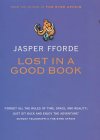
|
|
This book was surely one of the best books of 2001.
|
..And happily this is one of the best of 2002
|
I must admit that as one always is, I was worried about Jasper
Fforde's follow-up to his ultra-successful 'The
Eyre Affair'. The first novel was pretty damn pristine in terms
of invention, enjoyability, characterization and sheer exuberance. In
'Lost in a
Good Book', Fforde decided to emphasize the witty literary satire
and wrote a book that managed the difficult feat of being better than
the first. You want the Red Queen from 'Alice in Wonderland'? You've
got her! You want characters from Kafka, Dickens, and Edgar Allen Poe
put into the linguistic DJ mix? You've got them! Most importantly of
all, you've Thursday Next, still feisty, steadfast and now unstuck in
the great works of literature as she becomes an agent of
Jurisfiction. Fforde keeps up the tidal wave of jokes, puns, and
lovely turns of phrase, while making Thursday as appealing as any
character you're likely to encounter. And, in case you were
wondering, yes this book does have Jack Schitt.
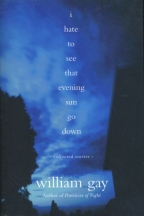
|
|
If you were to hold a gun to my head and ask what one
book was the best of 2002, the words I would speak would be
the title of this book.
|
I had to kind of force myself to buy 'I
hate to see that evening sun go down'. It was a collection of
short stories by an author whose two novels I had liked a lot even
though they weren't exactly my in my default range of selection. But
the slowly and handcrafted feel of the language in 'Provinces
of Night' and 'The
Long Home' impressed me enough to impel me to buy this
collection. Readers will know that I'm disinclined to read short
story collections even by authors I like a lot. So when I read this I
was doubly surprised. It was wonderfully, awesomely incredible. It
was a revelation on the order of reading Flannery O'Connor for the
first time. It's been out ever since I finished reading, so I can go
back and sample the pure pleasure of reading 'Those Deep Elm Brown's
Ferry Blues' again. Gay is a powerful writer with language skills
that far outstrip most you will have the pleasure to read. He
re-creates the world in his own imagery. His characters, confused old
men, wavering scholars and young men bent on revenge, get fixed in
the reader's brain without the reader ever being aware it has
happened. Gay is writing the pure literature that is also purely
enjoyable. It's a remarkable collection.
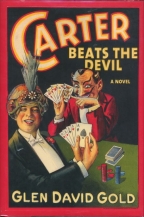
|
|
I bought this book for more people than any other book
last year. I also loaned it to more people than any other
book last year.
|
If you're looking for a book to give as a present to someone,
anyone, your absolute best bet is Glen David Gold's 'Carter
Beats the Devil'. This was one of those books I bought with great
enthusiasm and avoided with equal enthusiasm once I got it. When I
finally got round to reading it, I thumped my head against the wall
one time for every week I postponed reading. 'Carter Beats the Devil'
is a delightful and intricate historical novel based on the life of
Charles Carter, a real magician who worked in
turn-of-the-twentieth-century San Francisco. Gold infuses his novel
with a remarkable blend of grim illusions and upbeat backstage
antics. He writes a clever mystery, a charming romance, an adventure
novel complete with pirates and presidents and weaves it all together
into a sublimely enjoyable whole. I talked to Gold last year, and the
interview is still online. His tale of writing the novel is almost as
fascinating as the novel itself. Don't miss this wonderful literary
magic trick.
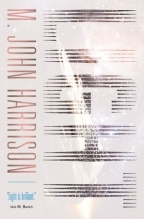
|
|
M. John Harrison went beyond the ends of the universe
to fetch back the compelling text for 'Light',
|
It had been a long time since I'd read M. John Harrison's 'The
Course of the Heart'. But it still lingered in my memory, somehow
poignant and detailed. Though I read it as a horror novel, it had an
autumnal sunset feel that was more nostalgic than horrific. I hadn't
read any of Harrison's classic SF or fantasy novels. So I wasn't
prepared for the brilliance of 'Light',
Harrison's latest foray into both science fiction and horror. It's a
deeply disturbing, compelling and ultimately blinding novel, in spite
of its title. If you like your novels complex and twisty, surreal,
funny, and filled with scientific conjecture revised into humane
literature, then this is your ticket to several sleepless nights.
Harrison is at the top of his unique game here, delving into the
darkness and doubt of the human heart of a researcher who cannot
avoid the visions he has been bequeathed into the infinite. Harrison
strides the stars with equal aplomb in a far future as gaudy as the
mind of his madman is grotesque. This is one of those novels that
will go right back into the re-read basket. The medium is gorgeous,
the message is sublime. 'Light' is a triumphant return to places
nobody has ever journeyed by a writer who has seen places in the
human heart nobody wants to remember.

|
|
China Mieville pleased all of the people all of the
time in his second novel, 'The Scar'.
|
Back in the year, I asked who needs 'Star Wars' when you've got
'The Scar'. Now the
question is who remembers 'Star Wars' and who could forget 'The
Scar', China Mieville's proof positive that he intends to build
worlds that answer to no rules but those he breaks with his own wild
imagination. I found myself rather mystified by those who considered
'Perdido Street Station' too grotesque. To me it simply seemed to be
an imaginative piece of fiction that was not easily categorized and
certainly easy to enjoy. But I must admit that 'The Scar' is a bit
easier to enjoy, even though the main character is off-putting as any
scene of creatures or creepiness from 'Perdido Street Station'.
Mieville manages to strike all the right notes at all the right
times, including an especially observant bit of characterization
here, an exuberantly imaginative landscape there, but never seeming
to let any one aspect of his mosaic overwhelm any other. There seems
to be little that Mieville does not do with great verse and skill.
He's extending the background of the world of Bas-Lag to create an
almost science-fictional feel. His novels aren't even available as
domestic hardcover editions. It's a tribute to something in the
publishing industry.

|
|
Richard Morgan's 'Altered Carbon' was a gripping
mystery set an intriguing future. Morgan himself has an
intriguing future. One hopes they make a good movie version
of this book.
|
Richard Morgan's 'Altered
Carbon' was rejected by domestic US publishers and had to come to
us via the folks at Victor Gollancz. As you read this taut,
well-written imaginative science fiction mystery set in the San
Francisco of the 26th century, you'll wonder what the folks over here
were thinking. Apparently, Joel Silver, the producer of 'The Matrix'
has bought the movie rights. As I read 'Altered Carbon', I was
thinking Elmore Leonard and Philip K. Dick when I wasn't thinking
that Morgan is one of the surefire stars of the coming years. Morgan
gets all the grace notes of a fine American mystery, with mysterious
tycoons, vengeful ex-wives, grunt cops and hard-boiled private
investigators. In itself, the mystery genre aspect of this novel is
amazingly satisfying and complex. But Morgan has created a
fascinating futuristic background with body-swaps the standard and
resurrected suicides calling for an investigation into their own
deaths. Even the barely glimpsed universe of space travel and alien
artifacts seems detailed and compelling. That's good, because
apparently there's a lot more about this in the even grimmer sequel,
'Broken Angels', which I have on my shelf waiting to be read. Expect
a report on this highly anticipated novel soon.
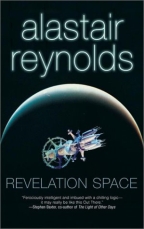
|

|
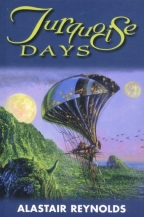
|
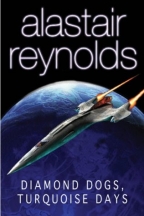
|
|
This novel attracted my attention from Langford's
positive *.co.uk review.
|
Expect to hear a lot about this novel when it comes
out later this year in the US.
|
In the meantime, enjoy the beautiful vision and
complex world Reynolds creates in 'Turquoise Days'.
|
In case you missed two of Reynolds' more limited
editions, Victor Gollancz have brought them out in this
attractive hardcover. I have both and plan on buying this
one anyway.
|
Yes, Morgan is in the same seat that Alastair Reynolds was in a
couple of years ago when his first novel, 'Revelation
Space' was released by Gollancz. This year, Reynolds direct
sequel to that novel, 'Redemption
Ark' was released, it surely redeemed the expectations that
awaited it. Look for it to appear on the awards lists next year.
However, for a concentrated dose of Reynolds at his wonder-making
best, you need look no further than 'Turquoise
Days', the first in a new line of Golden Gryphon novellas. To be
sure, 'Redemption Ark' will bubble up in the top ten the following
day, with its complex tapestry and the sturdy appealing heroic
Clavain. But it was the blues and greens, perhaps of the cover, that
drew me into 'Turquoise Days', and managed to submerge me in the
creation of a world as beautiful as the language that describes it.
It also helps that Reynolds manages to do in a novella what few
writers can accomplish in a novel. He creates a world, characters
that are complex and compelling then changes that world and the
characters utterly and understandably. This one gets shuffled into
the re-read pile as well, especially since it's now out in a
hardcover that combines it with Reynolds' 'Diamond
Dogs'. I talked to Reynolds during Worldcon, and you can hear
what he has to say for himself in the interview.
If you let your mind picture the world the Reynolds creates, you
won't want to leave.
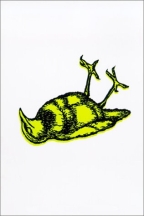
|
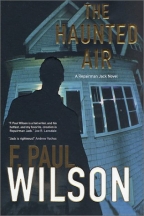
|
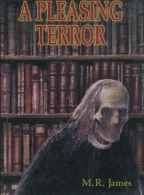
|

|
|
Chuck Palahniuk's entry into the horror genre was a
literary machine gun.
|
F. Paul Wilson brings his Repairman Jack series to new
heights.
|
This collection of M. R. James supernatural fiction is
the best possible example of an omnibus collection.
|
Tom Standage's tale of a man and a machine reads like
a novel of alternate history.
|
And yes, I could go on at length about the other ten books that
leaped to mind but were eventually elided due to space
considerations, and the fact that I have to get ready for lots of
other work. But included amongst those is Chuck Palahniuk's
'Lullaby', a
machine-gun burst of language that stitches a story of supernatural
vengeance into your skin. Palahniuk was very entertaining in his
interview. I was giddy
with joy as I read F. Paul Wilson's 'The
Haunted Air'. The latest Repairman Jack novel is clearly the
best. Ash Tree's opus collection 'A
Pleasing Terror' has been mentioned extensively, and it's worth
bringing up again. Collecting all of M. R. James supernatural fiction
in one volume with extensive commentary and annotation, it's a pure
example of publishing wisdom, generosity and skill. Tom Standage's
'The Turk' is a
close second to Glen David Gold's 'Carter Beats the Devil' for sheer
recommendability. It's the non-fiction story of a man and a very
cleverly designed machine.
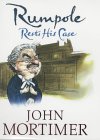
|
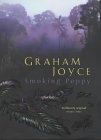
|

|
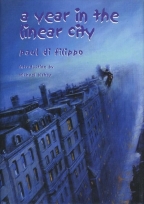
|
|
A welcome word from the master of Shakespearian
humor.
|
Graham Joyce wrote a wonderful tale of
fatherhood.
|
Brookmyre's bad guys steal the show with rants worth
ranting about.
|
DiFilippo's 'A Year In the Linear City' has all the
complexity of a novel in a novella's length.
|
John Mortimer brought back Rumpole for 'Rumpole
Rests His Case', a welcome burst of Shakespeare-tinged humor from
the reliable author. Graham Joyce's 'Smoking
Poppy' was an affecting and deadly accurate look at fatherhood.
Scottish mystery writer Christopher Brookmyre brought us a sequel to
'A Big Boy Did
It and Ran Away' in 'The
Sacred Art of Stealing'. PS Publishing did a lot of great work
this year, but Paul DiFilippo's 'A
Year in the Linear City', like 'Turquoise Days', did the work of
a novel in a novella's length. It was full of life, detail,
imagination and emotion.
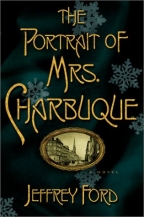
|
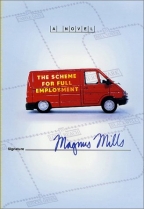
|
|
This should have been a top ten bestseller.
|
In the alternate reality that is the world of Magnus
Mills, this might just be a top ten bestseller.
|
Jeffrey Ford's 'The
Portrait of Mrs. Charbuque' should have hit the bestseller lists.
And Magnus Mills 'The
Scheme for Full Employment' still has time to do so.

|
|
Mo Hayder's 'The Treatment' is odious, disturbing,
occasionally badly written and occasionally very well
written. But I didn't forget it, and that probably means
something.
|
And finally, today -- the day after -- I find myself adding
'The Treatment',
by Mo Hayder. This odious and occasionally badly-written sequel to
her first novel, 'Birdman' is about a ring of kiddie-porn movie
makers. It's pretty hard to read if you're a parent. Hayder's main
character is a super-handsome detective, his girlfriend is a tortured
artist, and they're both rather annoying. But Hayder's criminals and
perverts are amazingly well-written. Maybe it's just horrified
fascination, but it certainly stands out.
For my reading experience, 2002 was a good year. I look forward to
2003 to be even better, and have better coverage in this column. I'll
be covering The Fantasy Rainbow, some new releases for 2003, and lots
of stuff I haven't even heard of yet. That's what makes reading so
great -- the stuff you haven't read.
Thanks,
Rick Kleffel

























